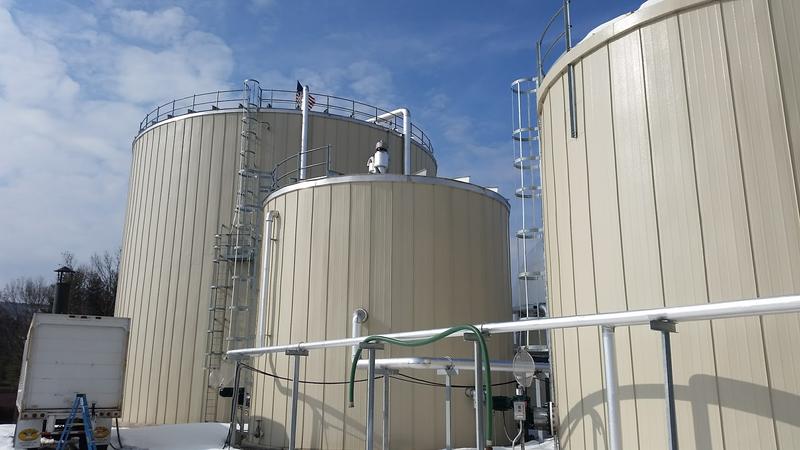Connecticut's First High-Tech Food Waste Recycler Set To Come Online
WNPR February 20, 2017 Quantum Biopower's anaerobic digester is licensed to process 40,000 tons of food waste per year.
Quantum Biopower's anaerobic digester is licensed to process 40,000 tons of food waste per year.
In 2013, Connecticut's legislature passed a law requiring some businesses to recycle old food, but the rule has a catch: it only applies if a certified recycler is nearby -- and able to take it. The idea was to jumpstart a market for organic recycling in Connecticut. And now, more than three years later, the first of those new recyclers is set to come online.
Inside Quantum Biopower in Southington, Brian Paganini and I stood near a giant pit filled with taco shells, old hot chocolate powder, pasta, graham crackers, and lots of other old and expired food.
"In that pit, there are macerators and augers and grinders that turn food waste into a pumpable slurry," Paganini, vice president at Quantum Biopower, said. "You can kind of hear what's going on right now."
If that pit is the mouth chewing up the food, Quantum's anaerobic digester -- a giant metal silo located right next to it -- is the stomach. The core of this newly-minted waste-to-energy plant, which "digests" old food, captures its methane, and soon, will turn that gas into useable energy.
"Probably late April, early May is when I'd anticipate putting electrons on the grid and actually firing the generator," Paganini said.
That means some stores and other big producers of food waste will have to recycle organics at the plant, thanks to the state law which passed in 2013.
"We hit points in Hartford, Waterbury, northern New Haven," Paganini said. "So anyone within our 20-mile ring around this facility is now mandated to bring their food waste into this plant."
Individual consumers aren't impacted by the law. "This is more of a merchant digester, so it's built to take all comers - food waste. Liquid waste. Pre-and-post consumer waste streams. Packaged waste streams," Paganini said.
Other companies in Connecticut are planning digester projects, but have been held up by permitting. Construction on a digester in Bridgeport has been delayed due to PCB contamination on the building site, according to the state Department of Energy and Environmental Protection.
That means Quantum is Connecticut's first digester. It's already taking in waste, and once fully operational, Paganini said the plant will generate enough electricity to power about 800 homes.
He's excited about one more thing, too -- scrubbing down the digester tanks, to resell about 10,000 pounds of processed slurry as a nutrient infused compost.